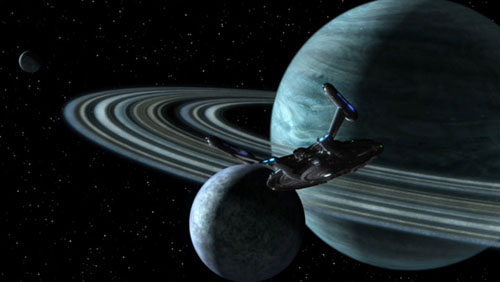Procyon system
| System Type | Binary system consisting of a Type F5IV-V (white main sequence) primary and a white dwarf companion.[1] |
| Astrography | Andorian sector,[1] (Sector 38G,[2] Sector 006),[1] Beta Quadrant[1] |
| Affiliation | United Federation of Planets[3] |
| Inhabited Worlds | Andoria (Procyon A VIIIa)[1][4][5] |
| Other Planets | Eight[1] planets of classes D, F, & J[6][4] |
| Other Stellar Objects | A mineral-rich asteroid field in elliptical orbit beyond the orbit of Procyon VIII[6][1] |
| Artificial Objects | Shipyards near Procyon VI,[6] Andoria VII Observatory[6] |
| Advertising |
Eight planets orbit Procyon A, a Type F5IV-V white main sequence star, as well as a white dwarf companion, Procyon B.[1] Procyon A is known as Kuy'va to the Andorians.[6][2] Only Andoria, the moon[4] of the eighth planet,[1] is habitable.[6] The other worlds, which range from the class D and F inner planets to the Class J gas giants of the outer system, remain as they have been for millennia, owing to the Andorian dislike for terraforming.[6] These worlds nevertheless are home to Andorian colonies and outpoosts, as well as some Starfleet facilities.[6] The most well-known of these is the Andoria VII Observatory, one of the best-known interstellar observatories in the Federation.[6]
An asteroid field rich in crystalline minerals lies in an elliptical orbt beyond the furthest planet in the system.[6] It is home to a small mining operation run jointly by the Andorians and the Dytallix Mining Corporation, a partnership first established shortly after the founding of the Federation.[6]
The Procyon system's central location deep within Federation space would make it a prime target for an invading force, but few targets would be more difficult to take. The system has a permanent starship presence, typically hosting several starships at a time. Most of these are from Andoria's home fleet, but numerous Starfleet ships are often found in the system as well.[6]
Notes and References
- ↑ Jump up to: 1.0 1.1 1.2 1.3 1.4 1.5 1.6 1.7 1.8 Mandel, Geoffrey. Star Trek: Star Charts. Pocket Books, 2002.
- ↑ Jump up to: 2.0 2.1 Heinig, Jess (Line Developer). Worlds. Star Trek Roleplaying Game. Decipher Book 7. Written by Eric Burns, Kenneth A. Hite, and Doug Sun. Original Art by Blake Beasley and Kieran Yanner. Decipher, Inc.. 2005.
- ↑ Roddenberry, Gene (Executive Producer). "Journey to Babel." Star Trek, Season 2, Episode 15. Directed by Joseph Pevney. Written by D.C. Fontana. Desilu Productions, 17 November 1967.
- ↑ Jump up to: 4.0 4.1 4.2 "The Aenar". Star Trek: Enterprise, episode 90. Television. Paramount Pictures Corporation, 11 February 2005.
- ↑ The "Star Fleet Technical Manual" listed the Andoria system as being the Epsilon Indii system. "Planets of the UFP: A Guide to Federation Worlds" and "Worlds" both listed Andoria as being the fifth planet of an otherwise-unspecified Andoria system, with a single G2III primary, also named Andoria. "Star Trek: Star Charts," however, established that Andoria was the eighth planet in the Procyon system, in keeping with the Star Trek: Enterprise episode, "The Andorian Incident," which established that Vulcan and Andoria were "neighboring systems." The episode "The Aenar" further established that Andoria was a moon in orbit of a ringed gas giant. To reconcile these conflicts, Andoria is listed here as Procyon A VIIIa, or the moon of the eighth planet orbiting Procyon A, in keeping with facts established in "Star Trek: Star Charts," which is most closely in line with those facts established on screen.
- ↑ Jump up to: 6.00 6.01 6.02 6.03 6.04 6.05 6.06 6.07 6.08 6.09 6.10 6.11 Isaacs, Ross A. (Line Developer). Planets of the UFP: A Guide to Federation Worlds. Star Trek: The Next Generation Roleplaying Game. LUG Book 25102. Written by James Cambias, Richard Dakan, Jeff Hannes, Harry Heckel, Kenneth A. Hite, Ross A. Isaacs, Sam Johnson, Steve Long, Christian Moore, Lou Prosperi, Justin Schmid, and John Snead. Original art by John Bridges, Joe Corroney, Andrew Currie, Mark Forrer, John Grigni, Pia Guerra, Steve Kurth, and Terry Pallot. Last Unicorn Games, Inc.. March 1999.

